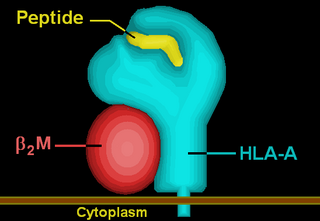
HLA-DQ5 (DQ5) is a human leukocyte antigen serotype subgroup within HLA-DQ(DQ) serotypes. The serotype is determined by the antibody recognition of β5.x subset of DQ β-chains. The β-chain of DQ is encoded by HLA-DQB1 locus and DQ5 are encoded by the HLA-DQB1*05 allele group. This group currently contains 4 common alleles, DQB1*0501, *0502, *0503, and *0504. HLA-DQ5 and HLA-DQB1*05 are almost synonymous in meaning. DQ5 β-chains combine with α-chains, encoded by genetically linked HLA-DQA1 alleles, to form the cis-haplotype isoforms. These isoforms, are all HLA-DQ1 encoded by the DQA1*01 allele group.

HLA-DQ6 (DQ6) is a human leukocyte antigen serotype within HLA-DQ (DQ) serotype group. The serotype is determined by the antibody recognition of β6 subset of DQ β-chains. The β-chain of DQ isoforms are encoded by HLA-DQB1 locus and DQ6 are encoded by the HLA-DQB1*06 allele group. This group currently contains many common alleles, DQB1*0602 is the most common. HLA-DQ6 and DQB1*06 are almost synonymous in meaning. DQ6 β-chains combine with α-chains, encoded by genetically linked HLA-DQA1 alleles, to form the cis-haplotype isoforms. For DQ6, however, cis-isoform pairing only occurs with DQ1 α-chains. There are many haplotypes of DQ6.

HLA-DQ1 is a serotype that covers a broad range of HLA-DQ haplotypes. Historically it was identified as a DR-like alpha chain called DC1; later, it was among 3 types DQw1, DQw2 and DQw3. Of these three serotyping specificities only DQw1 recognized DQ alpha chain. The serotype is positive in individuals who bear the DQA1*01 alleles. The most frequently found within this group are: DQA1*0101, *0102, *0103, and *0104. In the illustration on the right, DQ1 serotyping antibodies recognizes the DQ α (magenta), where antibodies to DQA1* gene products bind variable regions close to the peptide binding pocket.

HLA-DR51 is a HLA-DR serotype that recognizes the antigens encoded by the minor DR locus HLA-DRB5.

HLA-DR18 (DR18) is a HLA-DR serotype that recognizes the DRB1*0302 and *0303 gene products. Compared to DR17 which is found at high frequency in Western Europe, DR18 is found more in SE Europe and Central Asia.

HLA-DR17 (DR17) is an HLA-DR serotype that recognizes the DRB1*0301 and *0304 gene products. DR17 is found at high frequency in Western Europe. DR17 is part of the broader antigen group HLA-DR3 and is very similar to the group HLA-DR18.

HLA-DR15 (DR15) is a HLA-DR serotype that recognizes the DRB1*1501 to *1505 and *1507 gene products. DR15 is found at high levels from Ireland to Central Asia. DR15 is part of the older HLA-DR2 serotype group which also contains the similar HLA-DR16 antigens.

HLA-DR13(DR13) is a HLA-DR serotype that recognizes the DRB1*1301 to *13082, *1310 and some other *13 gene products. DR13 serotype is a split antigen of the older HLA-DR6 serotype group which also contains the similar HLA-DR14 antigens.

HLA-DR14(DR14) is a HLA-DR serotype that recognizes the DRB1*1401 to *1408, *1410 to *1418, and other *14 gene products. DR14 serotype is a split antigen of the older HLA-DR6 serotype group which also contains the similar HLA-DR13 antigens.

HLA-DR11 (DR11) is a HLA-DR serotype that recognizes the DRB1*1101 to *1110. DR11 serotype is a split antigen of the older HLA-DR5 serotype group which also contains the similar HLA-DR12 antigens.

HLA-DR12(DR12) is a HLA-DR serotype that recognizes the DRB1*1201 to *1203, *1206. DR12 serotype is a split antigen of the older HLA-DR5 serotype group which also contains the similar HLA-DR11 antigens.

HLA-DR10 (DR10) is a HLA-DR serotype that recognizes the DRB1*1001 gene product.

HLA-DR8 (DR8) is a HLA-DR serotype that recognizes the DRB1*0801 to *0807, and *0810 to *0812 gene products.

HLA-DR7 (DR7) is a HLA-DR serotype that recognizes the DRB1*0701 to *0705 gene products.

HLA-DR6 (DR6) is a broad-antigen serotype that is further split into HLA-DR13 and HLA-DR14 antigen serotypes.

HLA-DR3 is composed of the HLA-DR17 and HLA-DR18 split 'antigens' serotypes. DR3 is a component gene-allele of the AH8.1 haplotype in Northern and Western Europeans. Genes between B8 and DR3 on this haplotype are frequently associated with autoimmune disease. Type 1 diabetes mellitus is strongly associated with HLA-DR3 or HLA-DR4.

HLA-A3 (A3) is a human leukocyte antigen serotype within HLA-A serotype group. The serotype is determined by the antibody recognition of α3 subset of HLA-A α-chains. For A3, the alpha, "A", chain are encoded by the HLA-A*03 allele group and the β-chain are encoded by B2M locus. This group currently is dominated by A*0301. A3 and A*03 are almost synonymous in meaning. A3 is more common in Europe, it is part of the longest known multigene haplotype, A3-B7-DR15-DQ6.

